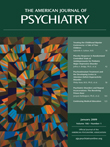Altered Striatal Activation Predicting Real-World Positive Affect in Adolescent Major Depressive Disorder
Abstract
Objective: Alterations in reward-related brain function and phenomenological aspects of positive affect are increasingly examined in the development of major depressive disorder. The authors tested differences in reward-related brain function in healthy and depressed adolescents, and the authors examined direct links between reward-related brain function and positive mood that occurred in real-world contexts. Method: Fifteen adolescents with major depressive disorder and 28 adolescents with no history of psychiatric disorder, ages 8–17 years, completed a functional magnetic resonance imaging guessing task involving monetary reward. Participants also reported their subjective positive affect in natural environments during a 4-day cell-phone-based ecological momentary assessment. Results: Adolescents with major depressive disorder exhibited less striatal response than healthy comparison adolescents during reward anticipation and reward outcome, but more response in dorsolateral and medial prefrontal cortex. Diminished activation in a caudate region associated with this depression group difference was correlated with lower subjective positive affect in natural environments, particularly within the depressed group. Conclusions: Results support models of altered reward processing and related positive affect in young people with major depressive disorder and indicate that depressed adolescents’ brain response to monetary reward is related to their affective experience in natural environments. Additionally, these results suggest that reward-processing paradigms capture brain function relevant to real-world positive affect.



